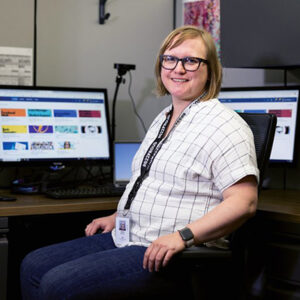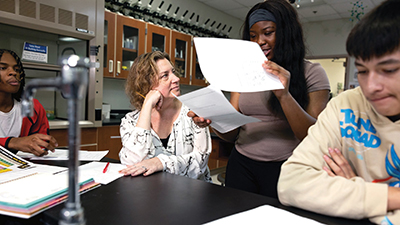Rethinking student and family engagement is the first step in closing post-pandemic learning gaps.
By Cindy Long, Senior Writer

In the first 25 years of Jody Murphy’s career, her students never answered a phone call in the middle of chemistry class. Then the pandemic happened.
“The students I have today are not the same students they were pre-COVID,” says Murphy, who teaches at North High School, in St. Paul, Minn.
Vexing, yes. But surprising? Not at all.
“Given all of the challenges of the pandemic, it’s no wonder kids aren’t engaged the way they were,” she says. “We need to find new ways to reengage them by recognizing where they are now.”
After attending NEA’s Accelerated Learning Program convening last February, Murphy feels like she has a road map to follow to get her students back on track.
She admits that feelings of defeat have plagued her and her colleagues, but after the meeting, she says, “[I feel] super-excited about education again. … I’m ready to jump in with both feet!”
As schools look at student learning post-pandemic and communities react to standardized test scores, NEA members are leading the conversation about how to boost student learning. Teams of education stakeholders—including educators, district leaders, and a parent or community representative—gathered for three days, in Los Angeles, last winter to explore best practices to accelerate student learning and offset learning delays.
NEA leaders invited 10 district teams to collaborate and share their experiences. They left the event with action plans grounded in education improvement science—meaning the application of small, measurable, and individualized changes that address specific issues in an educational setting and help uncover the root causes of problems. Each team developed local plans for 30, 60, and 90 days from conception to implementation.
There is no one-size-fits-all approach to accelerating student learning. The goal of the convening was to provide teams with ideas, insights, and planning time to develop multiple models that can be tailored to meet the academic and societal needs of individual communities across the country.
Murphy was part of the School District 622 North St. Paul-Maplewood-Oakdale Education Association team. Their first priority is to amplify student voices as a way to reengage them.
As a first step, Murphy has distributed surveys to students asking about changes they would like to see.
“One of the first questions I asked is what can I do to make [students] feel more supported,” she says. “If we want them to buy in, we have to change. This is the first generation of students who’ve lived with this kind of upheaval. If teachers don’t acknowledge that and change how they teach, we’re not going to make a difference.”
Fellow team member Jana Hedlund agrees. “We’ve experienced some of the most challenging years in teaching,” says Hedlund, who teaches high school special education. “Our kids need a new way of framing education and new ways of supporting them so they can get reconnected and be successful in school.”
The Accelerated Learning Program offers problem-solving around those issues.
The rush to return to in-person teaching and get “back to normal” was what everyone wanted, but there was little time to reflect, Hedlund adds.
“We forged ahead so quickly we didn’t have time to work with our district and have the conversations to learn from what we went through,” she says. “The Accelerated Learning Program is an opportunity to take a step back and do that. In collaboration with the district, union, administrators, families, students, and the community, we can adjust what we’re doing moving forward.”
Published: 08/07/2023 First Appeared In NEA Today, August 2023

